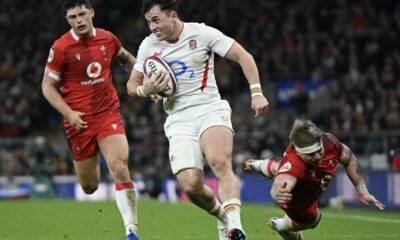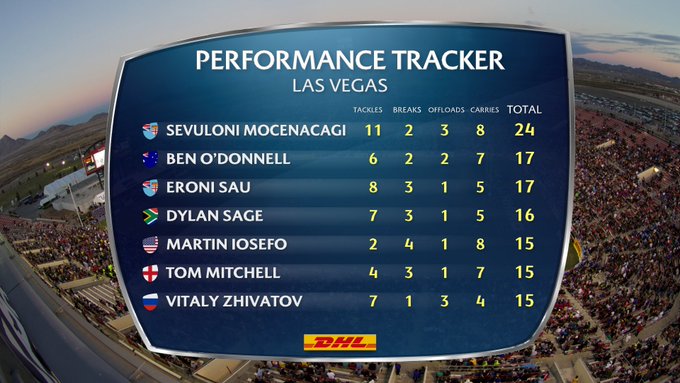7's
It’s all black in the Commonwealth as Blitsboks blow it
New Zealand’s Men and Women won gold at the Commonwealth Games and South Africa’s World Series Champion Blitsboks crashed to a fourth place.
The Blitsboks, who were the gold medal favourites at the 2016 Rio Olympics were stunned by Great Britain back then in the semi-finals, but did finish with a bronze medal. In Australia, at the Gold Coast, they couldn’t even get a bronze as they blew a 14-0 lead to lose the third and fourth play-off 21-14 to England.
New Zealand’s Women beat Olympic Champions Australila in extra time and New Zealand’s men won their sixth Commonwealth Gold in seven attempts with a 14-0 shut out of Olympic champions Fiji.
New Zealand has only ever lost one Sevens match in 20 years at the Commonwealth Games, and that was the final against South Africa at the 2014 Glasgow Games.
The Blitsboks have consistently been the best team in the world in the last two years and most pre-Games predictions were that they would take gold.
Unfortunately, the South Africans were drawn to play Fiji in the semi-final and the Islanders were just too good.
But no one would have anticipated the one-sided nature of the New Zealand dominated final.
AAP reported that the women’s decider was locked 12-12 at full-time, and it took until the first passage of extra time for Kelly Brazier to run length of the field to gift New Zealand the gold 17-12.
In a game littered with what-ifs for the Australians, Cassie Staples kicked the ball into the crowd while Australia had possession at full-time and within 40 meters of the tryline.
Even New Zealand captain Sarah Goss made mention of the costly mistake.
“I couldn’t believe it. I had no idea what was going on … but I am so proud of the girls,” Goss said. “It’s been an amazing run over the last eight weeks.”
For Australia coach Tim Walsh, it was the ultimate gatecrash.
Sunday was Walsh’s last day as head coach of a women’s team which has raised the national profile of the sport.
“We’re devastated … you can’t fault the effort we put in but we don’t like losing,” Walsh said. “We know we made some mistakes, they do happen … we did well to come back from 12-nil down, and credit to New Zealand.”
Speaking of the intense rivalry with Australia, New Zealand’s Theresa Fitzpatrick said: “They are our biggest competition and we are just as skilled, the skill level is high for both teams, it’s just about heart.”
Charlotte Caslick, one of Australia’s best at these games, didn’t come back on in the second half after a head knock.
Australia had already lost co-captain Sharni Williams, who was ruled out before the semi-finals with an injured left ankle.
The New Zealand men made it a double celebration by upsetting crowd-favourite Fiji after crossing for two first-half tries.
It was their defence that won the game – New Zealand captain Scott Currie pulled off try-saving tackle in the second half that showcased their tenacity.
An increasingly frustrated Fiji couldn’t find their rhythm in a scoreless second half, a rarity for two teams so skilled at running the ball.
“We watched the women go into overtime and their win at the end really inspired us to get the double,” said Tim Mikkelson, who was also part of the New Zealand squad that won gold in New Delhi in 2010. The New Zealand men celebrated later with a bare-chested haka on the field.
England got a double, too, beating Canada 24-19 in the women’s bronze-medal match and South Africa 21-14 in the men’s playoff for third spot.
7's
Africa’s Rugby Gold Rush in Accra

This was rugby history – and it was special to be at the University of Ghana in Accra for the first ever African Games rugby gold medal presentation, writes MARK KEOHANE.
Rugby was first played in the African Games in 1987 as an exhibition/demonstration sport but this week, 37 years later, the history belonged to the 13th edition of the African Games in Accra, where rugby made its debut as a competitive sport.
History made at the 13th #AfricaGames! 🏟️
Rugby sevens officially makes its debut at the African Games 🏉 🤩#ExperienceTheAfricanDream pic.twitter.com/foaJQVXsfa— African Union (@_AfricanUnion) March 19, 2024
Uganda’s men and women triumphed, doing the golden double, on a day where the sport was celebrated in West Africa and across the continent.
World Rugby’s mission statement is to grow the sport globally and while most of the attention is focused on Europe, South America, Asia and the Pacific Islands, the biggest growth area is in the African continent, home to over a billion people.
I have been blessed to report on rugby from so many cities and countries over the past 35 years. This beautiful game has taken me to North America, South America, many parts of Europe, the United Kingdom and Ireland, Hong Kong, Singapore, Australia and New Zealand.
Within the continent it has been primarily sub-Saharan Africa and every city and province in South Africa, getting to Windhoek, Harare and popping into Zambia. Nairobi was the extent of my East Africa exposure in covering Kenya’s World Cup qualifiers many years ago.
But this was a first for me in West Africa and to be witnessing rugby history and to walk the first ever field created for rugby specifically in West Africa is a rugby writing career highlight.
The facility at the University of Ghana is world class – and it is a credit to the organizers.
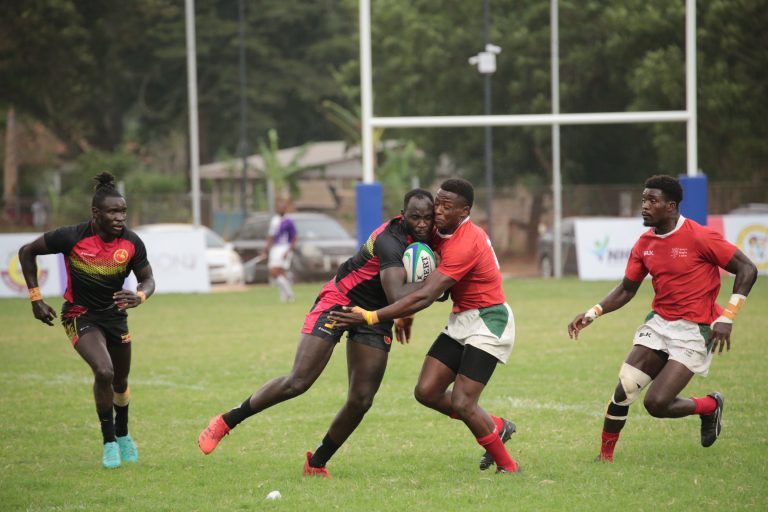
The 13th African Games, the property of the African Union, was originally scheduled for 2023, but had to be postponed until March, 2024, and that impacted on the availability of several teams who were preparing for Paris’s Summer Olympics qualification, with the global showpiece starting in the last week of July.
South Africa, given the Olympic qualification, was not in Accra, and Kenya, equally busy with Olympic qualification, sent a youthful squad. In the absence of South Africa and a full-strength Kenya, Uganda ignited the three-day event in being unbeaten in all the matches played by the men’s and women’s squads.
The gold was decided by a points league system, instead of a final, and both Uganda’s teams had secured gold before their final matches. Both won four matches in succession respectively, with the women beating Madagascar 29-0 in their final outing and the men too strong for Kenya in a 21-14 win.
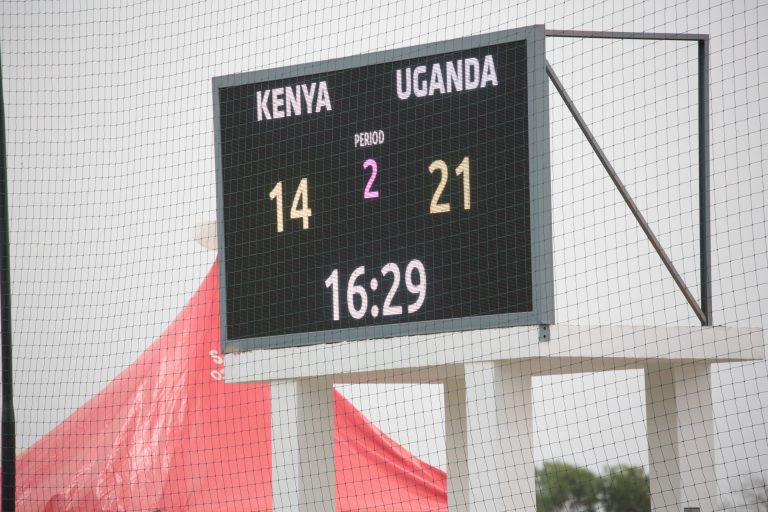
Kenya led through an early converted try, but Uganda scored 21 unanswered points before Kenya scored in the final minute.
Uganda’s Philip Wokorach was sublime in scoring two tries. He constantly troubled Kenya with his footwork and explosiveness in splitting the defence.
History makers @UgandaRugby 1st ever winners of #AfricanGames #Rugby. Unbeaten for men & women as @UgandaCranes @OurUganda7s do the DOUBLE GOLD Awesome debut for the sport @_AfricanUnion @WorldRugby @RugbyAfrique @RugbyAfrican https://t.co/8yMDoFOrBW
— Mark Keohane (@mark_keohane) March 21, 2024
South Africa’s Sevens specialists may not have been in Accra, but the country’s most celebrated Sevens specialist Seabelo Senatla was in Accra as part of Ghana’s coaching team.
Senatla was invited to consult with the host nation and his reward was to experience Ghana beat Zimbabwe. The latter would claim the silver, but Senatla described Ghana’s triumph as ‘stunning’.
Senatla played 203 tournaments for the Blitzboks between 2013 and 2018 and scored 224 tries for 1120 points. He is an Olympic bronze medalist and a Commonwealth and World Games gold medalist. He has also played a combined 100 matches for the Cape Town-based Stormers and Western Province in XVs.
Senatla applauded the event organisers and singled out the passion of the players and coaches.
‘There is such a love for the sport among the men and women and there is so much natural talent, skill and enthusiasm. The sport will only grow within the African Games, and the greater the exposure at future Games, the greater rugby’s footprint in Africa,’ said Senatla.
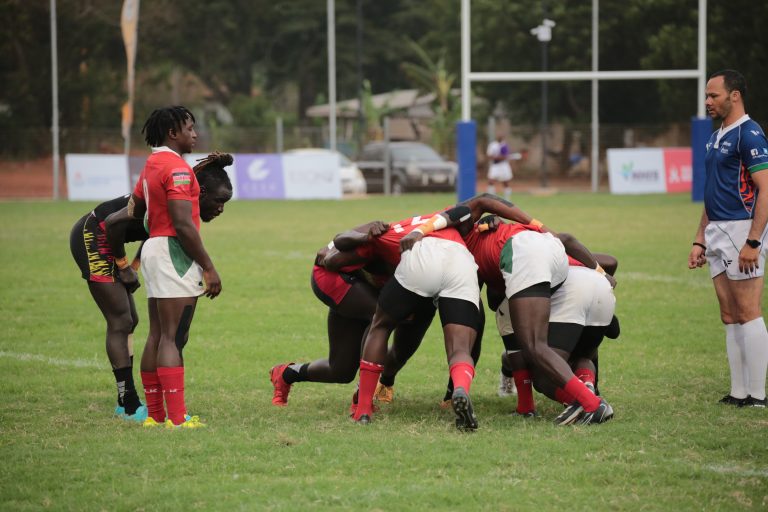
I’ve reported on every one of rugby’s top 20 countries and some outside of the top 20, but to be watching Nigeria, Benin, Burkina Fasu, Madagascar and Tunisia somehow seemed extra special in this historic rugby week in Accra.
Herbert Mensah, president of Rugby Afrique/Africa, said: ‘It is a historic moment for our sport and for the continent. My congratulations to Ghana. The African Games serve as a testament to our continent’s commitment to sports. It is a platform where our athletes can shine, our nations can unite, and the shared passion for the game can be celebrated on a grand scale.’
Experience Accra. #ExperienceTheAfricanDream ✨
Accra is not just playing host to the 13th #AfricanGames, it’s also winning hearts with its rich culture! 🔥 🇬🇭 pic.twitter.com/YTVLAtn30p— African Union (@_AfricanUnion) March 19, 2024
The next African Games will be in 2027.
Photos: Lauren Fredericks
7's
Fiji win big at Cape Town Sevens
7's
New Zealand take gold & Blitzboks get bronze
England stunned South Africa in the World Cup semi-final with a crushing 29-7 win. New Zealand also did the same in beating Fiji 22-17 and then went on to beat England 33-12 in the final. South Africa won the third place play-off against Fiji 24-19.
The New Zealand Herald reported that a Kiwi double-double – and two victory hakas – stole the show at the Sevens World Cup.
It’s the first time in each competition (female and male) that a team has successfully backed up the defence of a World Cup title.
The Black Ferns a day earlier had beaten France 29-0 in the final.
Sione Molia scored two of New Zealand’s five tries in the men’s final, while Joe Ravouvou also scored one to solidify his spot as the tournament’s joint leading tryscorer, before being named tournament MVP.
The Black Ferns were the favourites to triumph among the females but in the men’s competition it was South Africa and Fiji who had been expected to meet in the final.
South Africa, the form team and World Series champions and Fiji, the Olympic champions and form team, would have to be content with playing for the bronze medal.
The Blitzboks had shown incredible form to get to the semi-final, while England had to rely on an extra time golden score to beat hosts United States.
But a new day brought a new situation and South Africa’s Sunday turned to a shocker. The Boks led 7-0 early through a seven pointer from Selvyn Davids, but that was as good as it got as England fought back to win 29-7, after leading 17-7 at halftime.
New Zealand, who just sneaked past France, somehow, found form to beat Fiji.
Earlier in the weekend, South Africa’s Blitzboks qualified for their first ever World Cup semi-final with an imposing 36-5 win against Scotland. It is the first time in 21 years the Sevens Boks have made it this far in the World Cup.
South Africa led 36-0 before Scotland scored with the final play of the game.
South Africa will play England in the semi-final. The English won a pulsating quarter-final 24-19 that went into extra time after the scores were tied 19-all.
The other semi-final is between Olympic champions Fiji and defending World champions New Zealand.
The Blitzboks have been brilliant so far.
On day one, the Blitzboks caned Ireland 45-7.
Winger Siviwe Soyizwapi crossed over for four tries, allowing the Blitzboks to cruise past and Irish side who managed to score only in the final play of the match.
“I was quite fortunate out there today,” Soyizwapi said as he became only the ninth player (and the first since 2005) to score four tries in a Rugby World Cup Sevens match.
“The guys on my inside did all the work. When you have quality players like Justin Geduld, Werner Kok, Selvyn Davids and Rosko Specman feeding you try-scoring passes, my job is only to make sure I finish their good work,”
Captain Philip Snyman lauded the coaching staff in the wake of the victory, saying “The Irish had played Chile earlier in the day and there was a chance of them catching us cold. But the coaches decided on a training session earlier in the day and that helped us prepare, so we were ready for Ireland. Credit to the team, they took every opportunity and we never gave Ireland a chance.”
OIympic champions Fiji were sensational in beating Argentina 43-7. Fiji will play defending World Champions New Zealand, who edged France 12-7. The New Zealanders had three men yellow carded in the first half and trailed 7-0 at the break.
They controlled the second half and scored twice to secure the victory. They will have to be considerably better to get past Fiji.
New Zealand’s Black Ferns defended their title with a one-sided 29-0 romp over France. The Black Ferns were made to fight all the way in beating the USA in the semi-finals and the final proved a stroll by comparison.
CHAMPIONSHIP ROUND DRAWS
Men’s tournament
Quarter-finals
Scotland 5 v South Africa 36
United States v England
Argentina 7 v Fiji 43
France 7 v New Zealand 12
Women’s tournament
Semi-finals
New Zealand 26 v United States 19
France 19 v Australia 12
Final
New Zealand 29 France 0
7's
Experienced Blitzboks side selected for World Cup
Springbok Sevens coach Niel Powell has selected a squad boasting experience for the Rugby World Cup Sevens in San Francisco next weekend.
South Africa, standing as current World Sevens Series champions, are the top seed for the World Cup, which will take place between the 20-22 July at AT&T Park in San Francisco.
While only captain Philp Snyman has World Cup experience (playing in Dubai in 2009 and Moscow in 2013), all 12 squad members were involved in the last World Series, played across 10 tournaments around the world.
Snyamn will become the first Blitzbok to play in three RWC tournaments, and he will be bolstered buy the experience of Springok Sevens regulars Rosko Specman and Selvyn Davids who are returning from injury.
Kyle Brown, Cecil Afrika, Chris Dry, Seabelo Senatla (who all played in Moscow in 2013), Tim Agaba and Stedman Gans were ruled out due to injury, while Kwagga Smith and Sikhumbuzo Notshe were not considered due to Super Rugby commitments.
“I am pleased with the squad,” Powell said.
“The team was picked with this tournament in mind and I am pleased that these 12 players are all on form and best suited for the way we approach the knock-out format of the event.
“A couple of players missed out on final selection, but did contribute to our overall preparations and those efforts are appreciated and acknowledged. Just as all of the 28 players contributed towards our World Series title, all involved did great work in order to get these 12 players ready for next weekend.”
Snyman is set on doing his country proud in his third RWC appearance, saying,“We have received wonderful support from our supporters here in the Southern Cape and Gauteng last week and that made us even more determined not to let them down.
“We do not have the greatest of records in this tournament, but that said, we know we will be a very competitive team if we play to our strengths and within our game plan. It is exciting times for all of us and we are ready to do our best for our country.”
Springbok Sevens RWC side
1. Ryan Oosthuizen
2. Philip Snyman (captain)
3. Dylan Sage
4. Zain Davids
5. Werner Kok
6. Heino Bezuidenhout
7. Dewald Human
8. Rosko Specman
9. Justin Geduld
10. Selvyn Davids
11. Siviwe Soyizwapi
12. Ruhan Nel
7's
Blitzboks remain sevens champions with English win
The Blitzboks retained their Sevens World Series crown with a 24-14 victory over England in the final of the Paris Sevens.
South Africa took an early 7-0 lead with a converted try from Werner Kok, however England responded as speedster Dan Norton evaded the defence and put Oliver Lindsay-Hague away for a converted try.
Just before half time Norton crossed over for a try of his own, to be converted, seeing England take a 14-0 lead one minute before the break. But South Africa refused to go into half time 7 points down and held onto the ball to score a try through Dylan Oosthuizen two minutes after the hooter, levelling the scores for the second half.
Dewald Human then struck early for the Blitzboks taking them to a 21-14 lead at start the second half. South Africa then capitalised on a penalty from the English in their own 22, opting for a kick at goal which took their lead to 24-14.
England were unable to strike back over the next three minutes and South Africa hung on to claim the Paris Sevens victory and World Series title.
7's
Injury and defeat big blows to Blitzboks World Series title hopes
Blitzboks captain Kyle Brown will miss the rest of the season after a weekend in which the South Africans for the first time this year gave up top spot in the overall World Series standings. Fiji are the new leaders, albeit by a slender four points.
The South Africans could only manage fourth place in Singapore, with Fiji beating them 12-10 in the semi-final and then beating Australia 28-22 in the final. The Blitzboks lost the third and fourth play-off 26-24 to England.
Fiji, the 2016 Olympic champions, beat 2018 Commonwealth champions New Zealand 24-19 in the quarter-final.
The Blitzboks had seen off Kenya 24-12 in the quarter-final.
Brown was another high profile Blitzbok to suffer injury and he missed the final day and will also not be available for the World Cup and the final leg of the series later this year.
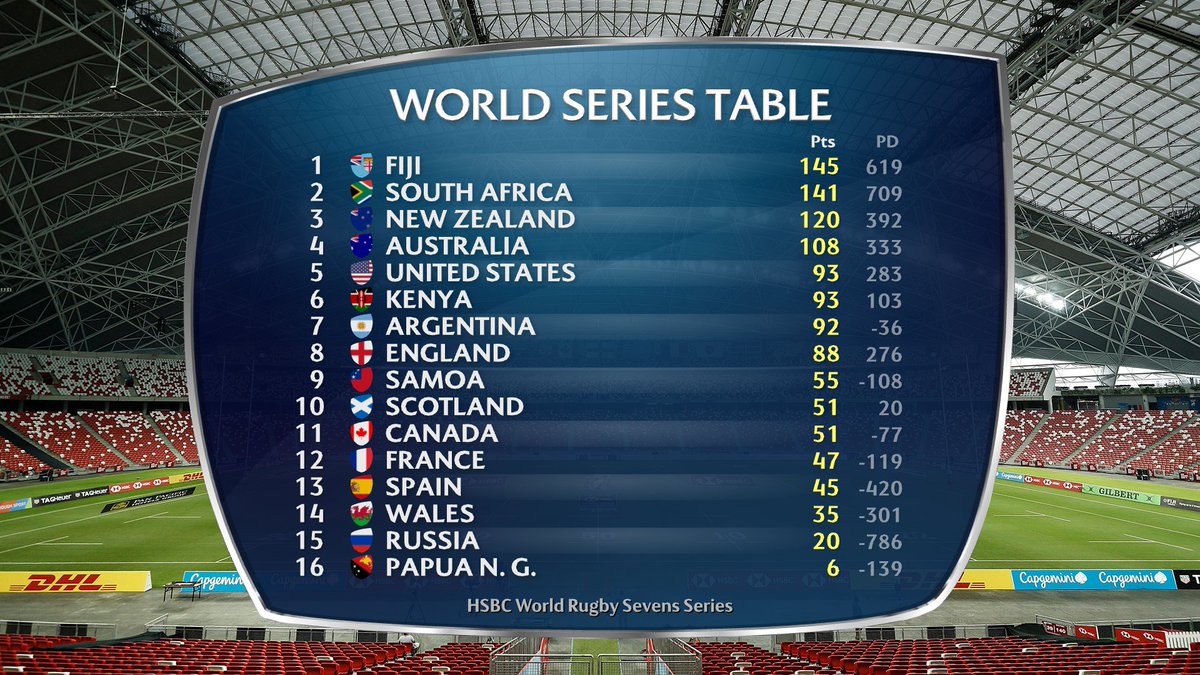
World Rugby’s Final Video Highlights
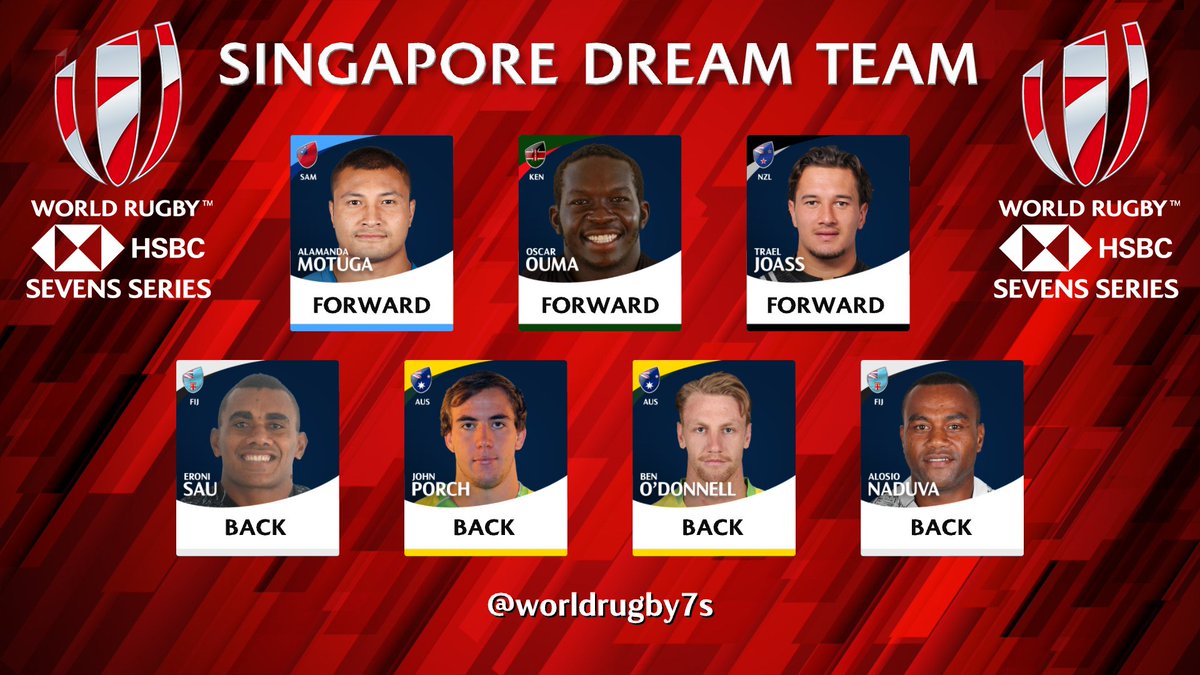
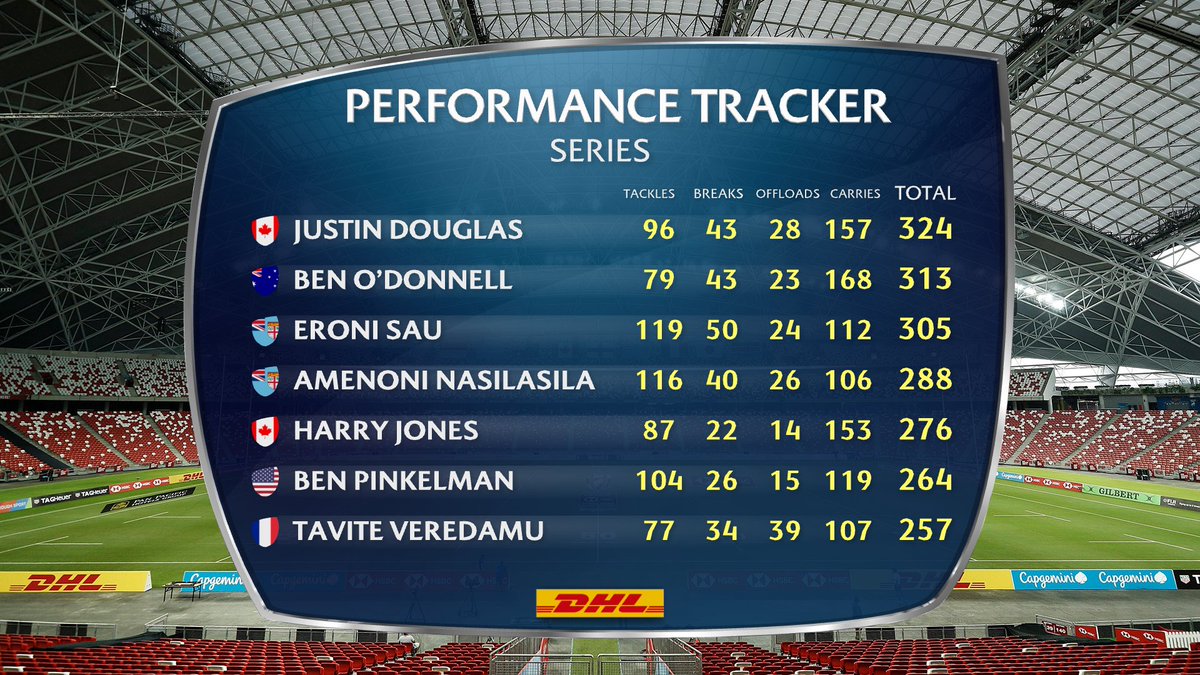
SA coach Neil Powell said he could not fault his players for effort.
“We asked the players for three things – to bring energy, look after the system and put in the effort, and they did that,” said Powell.
“We are very harsh when we evaluate ourselves and I am happy that they delivered on those things we wanted. We made some unmistakable mistakes though and we are still striving for that perfect game. The season is not over yet and I am looking forward to those two remaining tournaments.
“We have some senior players available back home, but after the performance of these younger players, there will be a good competition for places. The guys gave everything and it is sad that they did not get anything out of the tournament.”
Scorers:
South Africa
Tries: Muller du Plessis, Cecil Afrika, Stedman Gans, Werner Kok
Conversions: Afrika (2)
England
Tries: Charlie Hayter, Ruaridh McConnochie, Tom Mitchell, Michael John Ellery
Conversions: Tom Mitchell (3)
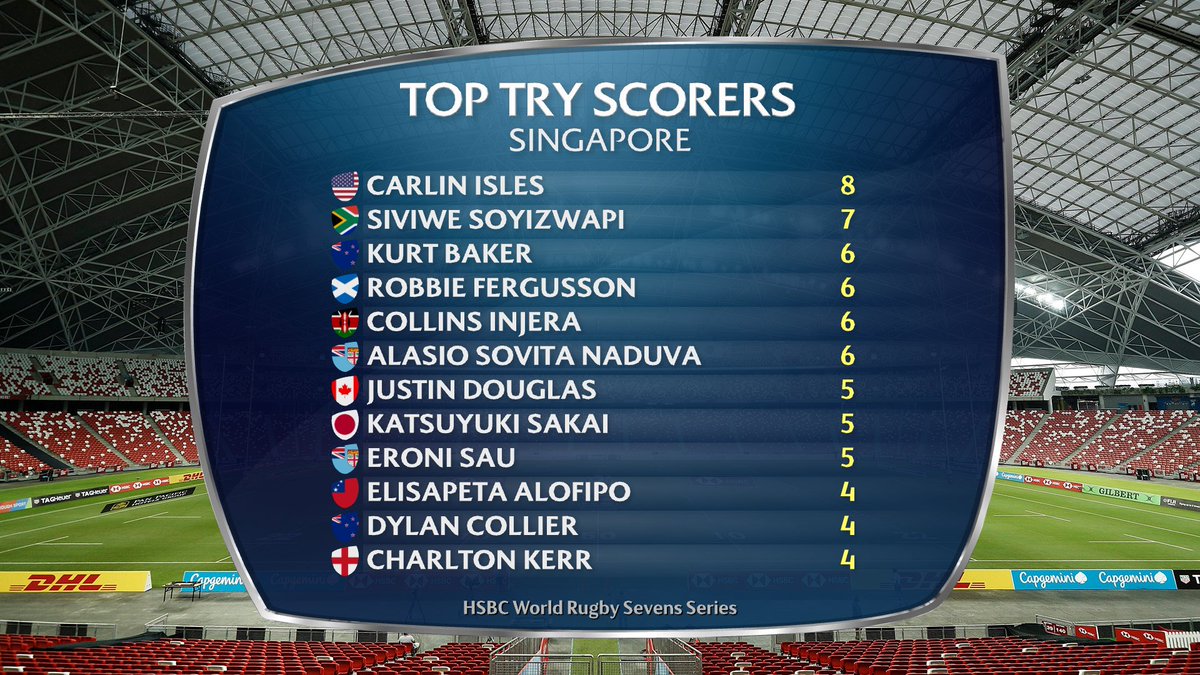
7's
Ranting about the Blitzboks’ flop, Raving about Warrick Gelant
My rants and raves for Independent Media following the weekend’s rugby action.
TOP RAVE
Warrick Gelant produced that one performance needed to kick down the door to the Springboks No 15 jersey. It has to be his in June. The statistics don’t do justice to Gelant’s impact in the Bulls’s brutal goring of the Sharks. Gelant made six passes, gained 34 metres on attack and completed six kicks.
What the statistics don’t detail is the quality of the kicks, one of which was a grubber perfectly weighted and worth seven points. The statistics also don’t include a player’s awareness of space, pace, off the ball impact and absolute presence in a position.

TOP RANT
The Blitzboks are our favourite team because of what they have achieved in the World Series 7s in the last two years but they’re also the biggest chokers after their failure to secure a medal in the Commonwealth Games. The popularity of the squad should not mask the major flop they were in the Gold Coast. Equally, they imploded two years ago at the Olympic Games.
At least they still left Rio in 2016 with the consolation of a bronze medal, but at the Commonwealth Games they blew a 14-nil lead to meekly surrender the bronze to England that will haunt them for the next four years.
For my other rants and raves for the weekend visit iol.co.za
7's
Betting Preview: Super Rugby, Pro 14, Commonwealth games
The Oracle is six from six on the Bulls this season but there’s no real money to be won on their visit to Durban. Keo has the Sharks to win by 10 points, while the Oracle’s money game is the Sunwolves against the Blues.
Hurricanes v Chiefs
I honestly cannot see the Hurricanes smashing the Chiefs, but I am not confident at all. An extremely tentative call here. Call: Chiefs 10.5 at 0.5 units
KEO: Hurriances, at home, have an advantage. All NZ derbies are generally close and within 10 points. I think this one will be within seven. Canes to win.
Sunwolves v Blues
Last year the Sunwolves won this fixture, against all odds, the Blues were out of sorts, this year the Blues are again out of sorts, although I have not quite got the Sunwolves right as often as I have expected this handicap is within the reaches of the Sunwolves, Waratahs narrowly beat it last week, the Waratahs are better than the Blues, it’s the 2nd week at home in a row for this Sunwolves team, I expect a better showing than last week and this week the plus gets my vote as Best Bet of the weekend. Call: Sunwolves +18.5 at 4 units
KEO: I’m with the Oracle on this one in terms of a good bet. It’s a very generous spread, given the absolute lack of form and results from the Blues in 2018.
Rebels v Jaguares
Rebels have blown hot and cold and this handicap seems a tad high, but neither teams gives me enough confidence to go large, so I will keep my stakes low here. Call: Jaguares +11.5 at 1 unit
KEO: Rebels will win comfortably. I have them to take this game 15-plus.
Highlanders v Brumbies
Brumbies won a game last weekend by a margin few expected. They won’t win this weekend and I have the Highlandeers to win this game comfortably. Highlanders -15.5
KEO: Highlanders to win by two scores.
Waratahs v Reds
I was initially a Waratahs punter until I saw them getting a plus-niner. This is way too much in my opinion. I expect the Reds to come close her, I will not right off them winning the game on the board, and I will however go a medium strike. Call: Reds +9.5 at 2 units
KEO: Waratahs will win by double digits.
Sharks v Bulls
I am now 6/6 calling the Bulls correctly but this handicap seems too low. I know the Sharks have had a good run of late, beating two handicaps with relative ease. I do like the Bulls of late and have made huge money on them so far, but this week I think they will find themselves in deep and I have the Sharks to cover this low 4.5. Call: Sharks -4.5 at 3 units
KEO: The Sharks are on a high but this will be a bruiser. I still think they’re good enough to get home by 10 points. That’s my call.
Pro 14
Cheetahs v Munster
This Cheetahs team are making a habit of irritating me, what usually look like decent handicaps never end up being that, the handicap is down to a single digit. I have chosen to believe that the Cheetahs have another habit, just winning. I do believe that they will just win this one. Call: Cheetahs on the board at 8/10 for a units
KEO: I have Munster to edge this one. They’ll include some of their big name internationals.
Kings v Cardiff
Last week’s game v Cheetahs was more of a bad Cheetahs game and I also do not believe that Cardiff will win this game by more than two tries. The Kings should stay within this generous handicap. Call: Kings +14.5 at 2 units
KEO: Cardiff to win by less than 10.
Zebre v Dragons
Dragons are in my opinion the worst of the lot in Pro 14, this handicap appears to offer serious value, I can’t go max but I will have a decent go on Pro 14 teams. Call: Zebre -5.5 at 2 units
Edinburgh v Scarlets
Edinburgh was my bog Pro 14 play last week, although I only got 1/6 I really believed I went the right way with Edinburgh, I was wrong and got smashed, this week I am going against them as I believe Scarlets are still buoyed by their qualification of the EURO Champions Cup semis. Call: Scarlets +3.5 at 1 unit
Leinster v Benetton
Surely Benetton can stay within +28.5, I am not confident and will go just enough to keep me interested, it just seems too high. Call: Benetton +28.5 at 0.5 units
Ulster v Ospreys & Glasgow v Connacht Both of these games handicaps look dead on, I will not be having a bet on either and thus call these two NO BET Called
Commonwealth Games Sevens
As many of you must have read my post on the Hong Kong Sevens you would have seen my unhappiness in SA fielding a B Team along with the likes of NZ, Aussie & England four of the Big five so to speak, Fiji and Kenya bucking the trend and going full strength, well done to both Fiji and Kenya.
This week we look at a bonus tournament for sevens punters like us and its obviously going to be a feast on the eyes, I have selected three teams to have an outright go on here… SA at 13/10 is not one of them, nor is England at 8/1 and there is no way I am interested in NZ at 4/1 I am having a go at Kenya at 25/1 for 0.25 units, Aussie the home team that won me some cash a couple of months ago at 28/1, even though 9/1 seems low, they are at home and deserve some respect I will go Australia 0.5 units at the 9/1 on offer, lastly Fiji are the business at 22/10 they should in my opinion be favourite, they get my interest at 22/10 just for 1.25 units for the Fijians, to close out a play of 2 units in total. The plays for the 1st eight games which start at 01h30 Saturday GMT +2 will be up at around 18h00 Friday GMT +2
Visit The Oracle at oraclerugby.com
Check out gamebet.co.za for this weekend’s betting
7's
Blitzboks remain top of the standings despite 4th place at Las Vegas Sevens
Whilst the Blitzboks ended the Las Vegas Sevens with fourth place, they still remain comfortable leaders of the World Series Standings.
The Blitzboks found themselves in the Bronze final, battling for third place against Fiji following their 12-10 defeat to Argentina in the Cup semi final.
Argentina and the USA progressed to the Cup Final, which saw a 28-0 victory for the Americans.
The Blitzboks came up short once again in the Bronze Final as Fiji won by just four points, with the final score being 26-22.
However, despite their fourth place finish, the Blitzboks still remain well in the lead of the World Series standings with their 92 points trumping log-second New Zealand, by ten points. Their opponents on the day Fiji, stand at third with 79 points whilst the Las Vegas Cup Winners (USA) don’t even feature in the top five of the men’s standings. Argentina stand at fifth with 67 points.
Logs and results following the Las Vegas Sevens can be found at:
7's
Blitzboks survive early Wales scare but Werner Kok not so lucky
Defending champions South Africa dug deep to end day one in Las Vegas unbeaten.
The Blitzboks beat Wales 26-21 after trailing 14-0 and eased past Canada 19-12.
South Africa’s Pool B rivals England were also unbeaten on Friday, running in six tries in a 40-12 rout of Canada, before a 33-12 win over Wales in which Tom Bowen ran in a hat trick.
Werner Kok was ruled out of the tournament with a jaw injury.
Fiji were emphatic in both wins against Russia and France, the USA beat Samoa and Australia and Argentina surprised New Zealand 26-19. It was the only the 10th win for the Pumas against New Zealand in 82 meetings.
New Zealand, currently second in the series standings, had beaten Uruguay 28-7 before falling to Argentina, who beat the Kiwis for just the 10th time in 82 meetings.
South Africa, whose run to the series title last season included a triumph in Las Vegas, lead the current standings on 77 points with New Zealand second on 69 and Fiji third on 62.
7's
Flying Fijian Alosio Naduva buries Blitzboks in Hamilton’s fantastic comeback final
Fiji were dead and buried in the final of the World Series Hamilton 7s. They were a man down in the first minute and changed ends trailing 17-5. Then came Alosio Naduva’s title winning heroics as the Blitzboks for the second successive tournament were blown away in a final.
The Blitzboks were in commanding form throughout the tournament, as they had been in Sydney a week earlier. Kyle Brown’s men were unbeaten in three matches on the opening day and on Sunday whipped Scotland 22-0 in the quarter-final and cruised past Sydney champions Australia 24-5 in the semi-final.
The tournament favourites and World Series defending champions looked as unstoppable in the first half, but then came the Fijian fight back. It was Olympic Champions against World Series Champions and this time the Olympic Champions triumphed. In Cape Town last year it was the South Africans who proved the masters in an epic quarter-final. Hamilton’s final was another reminder that currently these two teams set the standard in Sevens.
Hosts New Zealand, much improved from the rabble of the last two seasons, were edged 14-12 by Fiji in the semi-final and then lost 8-7 in a tense third place play-off against rivals Australia. It took a last play penalty drop goal to secure an unlikely 8-7 win.
South Africa, with three final appearances in the four events, remain on track to defend their World Series title of 2016/17 season.
Results
Quarter-finals
Fiji 12 Samoa 10
New Zealand 19 England 12
Australia 33 Kenya 12
South Africa 22 Scotland 0
Semi-finals
Fiji 14 New Zealand 12
South Africa 24 Australia 5
Bronze Medal playoff
Australia 8 New Zealand 7
Final
Fiji 24 South Africa 17
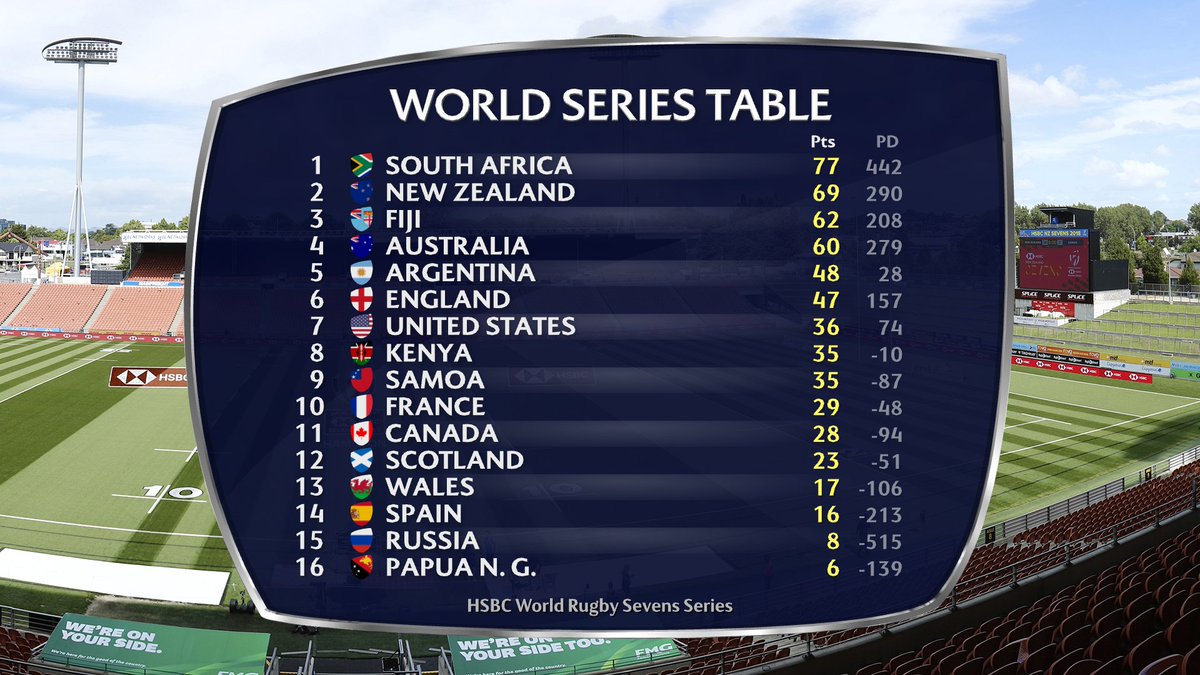
7's
Senatala & Specman superb as South Africa blitz England in Hamilton 7s
Seabelo Senatla was again in top form in South Africa’s unbeaten march into the inaugural Hamilton 7s.
Senatla struck early against England as the Blitzboks won comfortably 28-7.
Earlier the World Series Champions, led by Kyle Brown, had been brutal in dismissing Papua New Guinea (36-5) and Russie 38-0.
Senatla scored six tries on the opening day and Rosko Specman got five.
South Africa are the bookies’ favourite to win the tournament.
The South Africans play Scotland in Sunday’s quarter-final and the winner of this match will play the winner of Kenya and Australia in the semi-finals.
Hosts New Zealand play England int he quarter-final and Olympic Champions Fiji play Pacific Island neighbours Samoa.
The WorldRugby7s graphics show that it’s that man again, @Seabelo_Senatla of @Blitzboks. #NZSevens
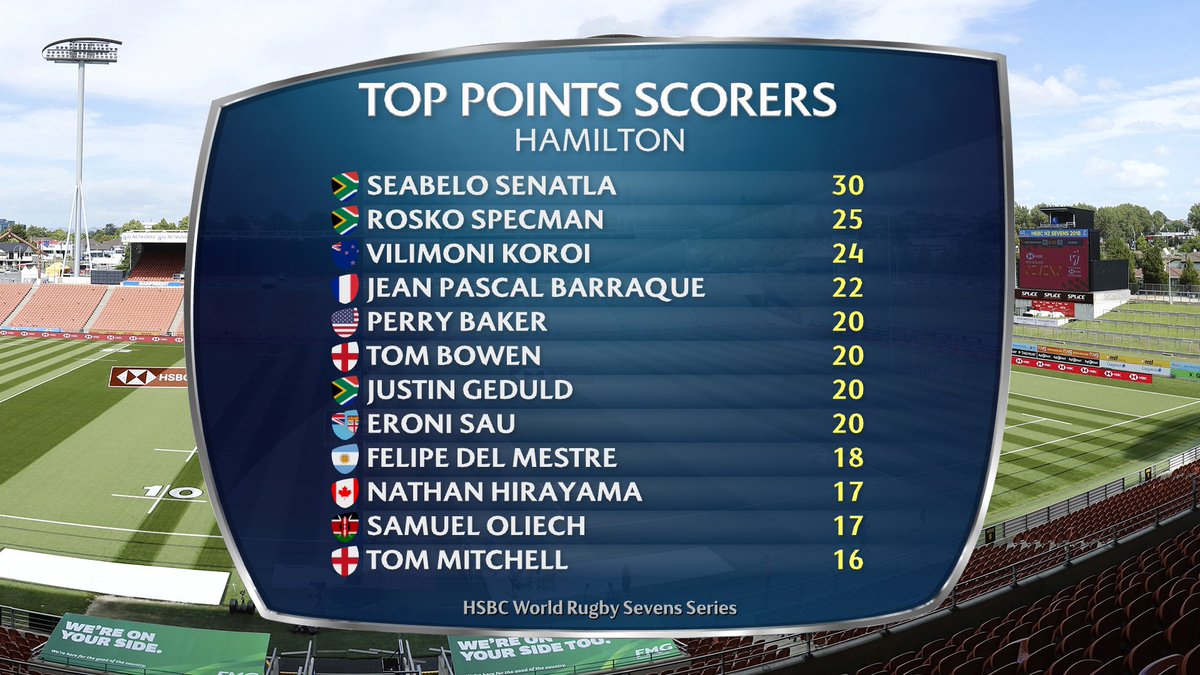
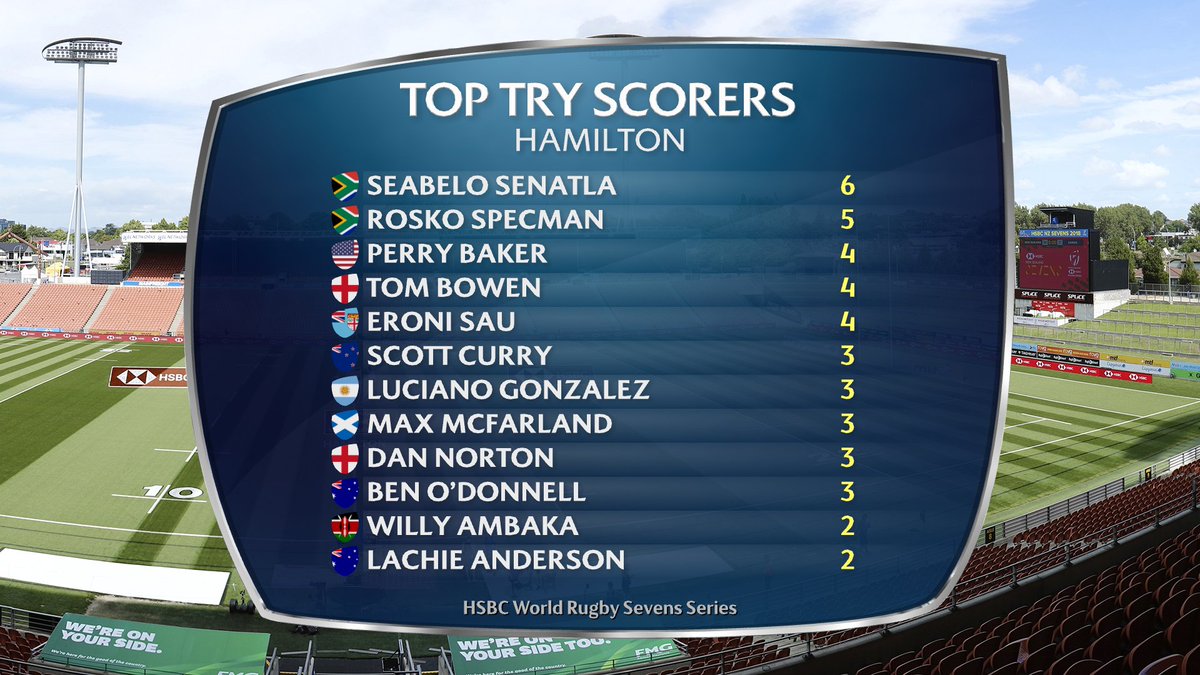
Werner Kok’s outstanding work rate is reflected in him being among the top three on the Performance Tracker for tackles, breaks, offloads and carries.
It’s Manuel Sainz of @ferugby who leads the @DHLRugby Performance Tracker after an impressive day one at the #NZSevens #DHLimpactplayer
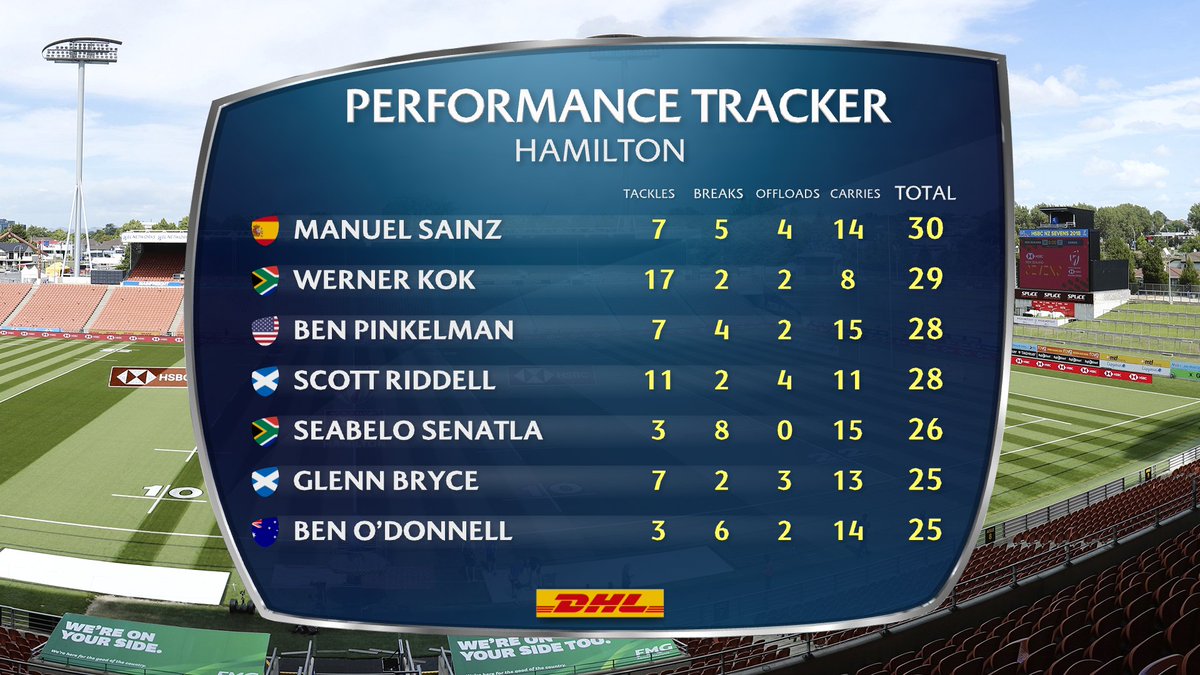
7's
What to look forward to this weekend at the Hamilton Sevens
Following a fantastic weekend in Sydney, fans can expect much of the same excitement, skill and talent on display in Hamilton this weekend. We pick three specific things to look forward to over the weekend.
BLITZBOKS “BOUNCE-BACK”
The excitement of the Blitzboks’ pool stage, semi and quarter final success at last weekend’s Sydney 7s was quickly shut down in the grand finale by an emphatic performance from the hosts as the Aussies walloped South Africa 29-0. However despite their final loss, the Blitzboks remain top of the table on the HSBC Sevens World Series standings by 4 points. They will be anxious to extend this lead and claim the Hamilton trophy. While they suffer two huge losses in the experience of Ruhan Nel and captain Philip Snyman, the exciting young prospects of SA Sevens Academy prodigies Zain Davids and Muller Du Plessis bolster their stocks. It will be nice to see them get some game time, although Du Plessis acts as the injury cover. Aside from that, fans can expect much of the same from the likes of Seabelo Senatla, Rosko Specman and Justin Geduld in terms of explosive speed and entertaining skill.
TIM MIKKELSON MAGIC
World Rugby Sevens Player of the Year in 2013, New Zealand’s experienced and accomplished Tim Mikkelson will be relishing the opportunity to play in front of his home crowd in Hamilton. “It’s good to be back, anytime you come home it’s something special,” says Mikkelson, who will be playing in front of a sold out stadium which will welcome 50000 fans over the course of the weekend. Sitting on a career tally of 999 points, Mikkelson will be looking to break the 1000 mark emphatically. And where better than in front of a packed stadium of home crowd support?
PERRY BAKER
While he gets mentioned in every build up to a Sevens weekend and raved about post them, it is not without justification. Baker continued his brilliant form in Sydney, topping the try scoring charts for the weekend with nine tries, and scoring a full-field stunner where both his pace and swerve were on display as he left defenders standing still. Baker was awarded the World Rugby Sevens Player of the Year award in 2017 is already making a claim for it in 2018. Expect more of the same from the speedster, and maybe even better, as he clocked a top speed of 37km/ph in one of his tries last weekend and will most likely do so again.
In case you missed it: HSBC Sevens World Series “Sydney Dream Team”
7's
Senatla the South African star of Sydney
As the Hamilton 7s nears, we reflect on the impact of Blitzbok Seabelo Senatla over the weekend of the Sydney 7s and his importance in the upcoming tournament.
Seabelo Senatla, in a career total of 187 matches, has scored 1055 points. Making his average 5,64. Basically, a try a match. And in Sydney this past weekend, Senatla’s performance remained consistent with what we’ve come to expect from him. Breathtaking speed and a steady tally of tries. In fact, not only did he make the HSBC Sevens World Series “Dream team”, he also racked up the second most tries of the tournament (8) second only to USA’s speedster Perry Baker (9).
Senatla, much like his team, has been an image of consistency on the sevens circuit the last few years, very rarely having a poor tournament. With the Blitzboks losing two key players to injury, in captain Philip Snyman and Ruhan Nel, they will be heavily reliant on Senatla’s experience and form at the upcoming Hamilton Sevens.
Just about each team has their own try-scoring-speed-machine, but what sets Senatla apart is his skill level. His measured running lines and his understanding of the game add hugely valuable variety to his pure speed. The Blitzboks remain top of the HSBC Sevens Table, despite their loss to Australia in the final of the Sydney Sevens last weekend. Will Senatla be a key player in helping them retain the number one spot this weekend and come away with a tournament win?
7's
Du Plessis’ Blitzboks inclusion indicative of superb selection process
18-year-old Muller Du Plessis’ inclusion as the reserve player in the upcoming Hamilton 7s, following the injury blow of Ruhan Nel, speaks volumes of the Blitzboks current attitude to selection and their success by virtue of it.
Du Plessis is an exciting young outside back, having played two years of Craven Week and SA Schools and captaining a strong Paarl Gym side in 2017. He went immediately into the SA Sevens Academy after finishing school and has represented sides at age group level since 2011, being part of the SARU High Performance set up since 2015.
What Du Plessis’ career thus far and subsequent international selection is indicative of is the identification system in South Africa gone right, which unfortunately is more the exception than the norm. He’s followed a path engineered for success at professional level, yet it’s the backing in the international set up that will allow him to thrive and bolster the Blitzboks’ already impressive and well functioning unit.
Often in South Africa, even when players have been correctly identified and groomed, as Du Plessis has, coaching and administrative reluctance to select a player based on form somewhat stagnates the players’ development, only to the detriment ultimately of the international side.
This where South Africa more often than not gets it wrong while New Zealand seem to have it just right. New Zealand has a thorough youth identification system in place, yet they are also willing to take risks when it comes to the selection of these talented youths. However taking a risk does not mean throwing the player into the deep end. Often, a young debutant has already been taken on an All Black tour the previous year just to learn and soak up the environment. Thus when he makes his debut, he’s unfamiliar to the opponent and inexperienced himself, yet not uncomfortable in the professional set up.
Du Plessis’ inclusion as a touring reserve for the Blitzboks in Hamilton is New Zealand-like in the best way. World Breakthrough player of 2017, Rieko Ione, comes to mind for me, as he was picked and backed to play for the New Zealand 7s side at the age of 17 in 2015 and had immediate impact, being chosen as World Sevens player of the year later that year. His form since has only got better.
Of Du Plessis, coach Neil Powell had the following to say, “Muller can learn and even play when called upon. He only finished school last year and is highly rated, having played SA Schools and for the SA Rugby Sevens Academy in South America recently. He is very talented and has a bright future and I think he will become a very good addition to our squad. The sooner we expose him to this level of play, the better.”
While Powell’s Intention is for Du Plessis to learn, he is picking him and backing him to play if need be, which is a system and attitude that the rest of South African rugby can learn from when trying to build up the quality of depth the New Zealand sides possess.
We have the means for identification and grooming and we have a wealth of talent. It’s up to the coaches and administration to now follow the Blitzboks lead when it comes to selection.
7's
Awesome Aussies batter Blitzboks in sensational Sydney triumph
Australia handed the Blitzboks a 29-0 beating in the final to win a World Series title on home soil for the first time in 16 years. The Aussie women’s team were equally brilliant in shutting out New Zealand 31-0 to make it an Australian double celebration.
Defending World Series champions South Africa, despite the defeat, remain top of the table after three events, having won one final and lost one final.
Seabelo Senatla, who was South Africa’s top try scorer, also made the tournament Dream Team. Yet in the final he hardly saw the ball, such was Australia’s dominance.
The Blitzboks were outstanding in being unbeaten in the Pool games and equally emphatic in dispatching Kenya (quarter-final) and the United States in the semi-final.
But the Aussies were equally impressive in the build up to the final, having dealt with New Zealand 24-12 in the quarter-finals.
And in the final they were dominant from the outset, with double strike in the last minute of the first half a hammer blow from which South Africa never recovered.
New Zealand, who lost to Fiji in the final play in their Pool match, reversed the result with a crushing 31-7 victory to take 5th place.
-
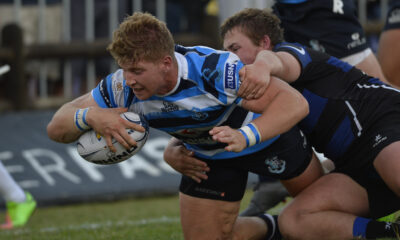
 KEO News Wire6 days ago
KEO News Wire6 days agoSouth Africa’s State of Origin – our Schools system works
-
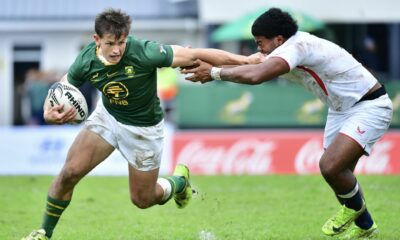
 KEO News Wire16 hours ago
KEO News Wire16 hours agoMarkus Muller will play for the Springboks in 2026
-
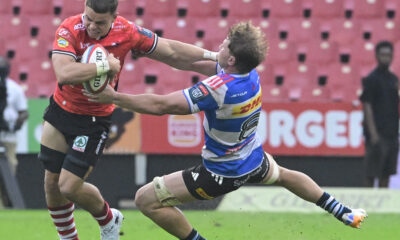
 KEO News Wire4 days ago
KEO News Wire4 days agoClarity beats clutter as lethal Lions outthink and outplay the Stormers
-
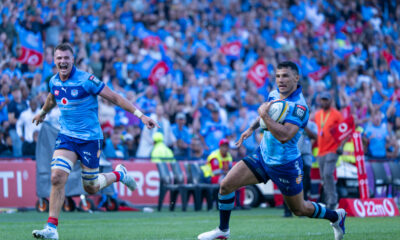
 KEO News Wire4 days ago
KEO News Wire4 days agoBrutal Bulls. Beautiful rugby. Bumper crowd.
-
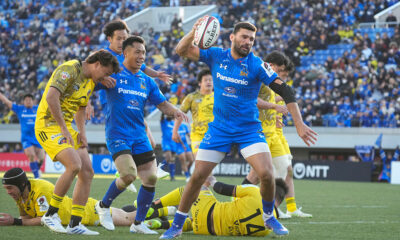
 International Rugby6 days ago
International Rugby6 days agoBok Damian de Allende is the best No 12 in the world
-
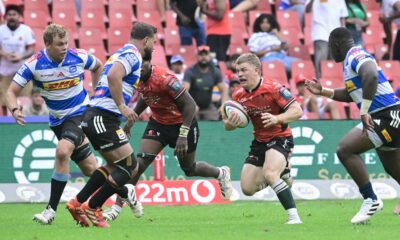
 KEO News Wire21 hours ago
KEO News Wire21 hours agoVodacom URC latest: South Africa’s road to the play-offs

